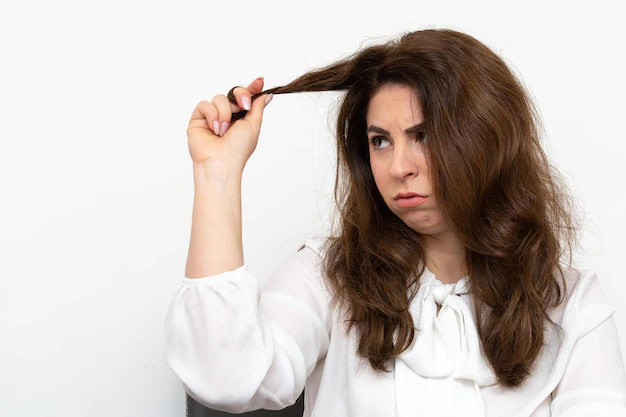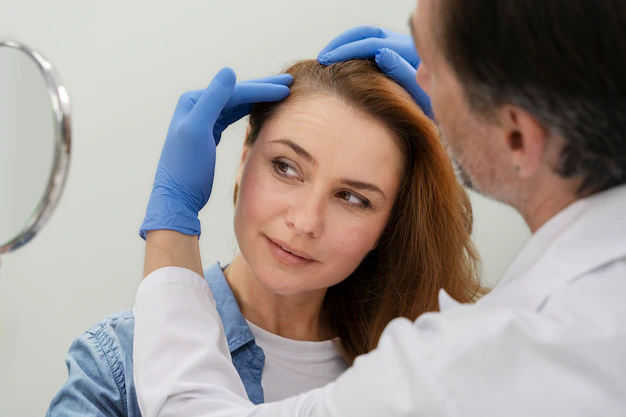Stress and hair loss don't have to be permanent. Additionally, if you control your stress, your hair may begin to grow once more. Consult your doctor
Stress and hair loss don’t have to be permanent. Additionally, if you control your stress, your hair may begin to grow once more. Consult your doctor if you have more frequent or sudden hair loss when combing or washing your hair. An underlying medical condition that can be treated is indicated by sudden hair loss. If necessary, your doctor might also suggest a course of treatment for your hair loss.
People are at risk for a number of health issues when they are under long-term, or chronic, stress. In addition to issues with digestion and sleep, they can also include anxiety and sadness. Long-term stress automatically gets connected with hair loss, however the causes aren’t fully understood. The stem cells that live in the hair follicle control the cycle of hair development. Stem cells divide as the body grows to produce new hair-regenerating cells. The stem cells are dormant during the period of resting. Researchers have now pinpointed the precise mechanism by which chronic stress damages hair follicle stem cells.
Technically speaking, stress-related hair loss is known as telogen effluvium (TE). Every hair on your body is in one of three phases at any given time: anagen (growth), catagen (transition), and telogen (resting). As already established, the trauma or stress that initiates it may be physical, emotional, or a combination of both. However, we’re not always referring to regular, persistent forms of stress. Instead, a single, stressful event is typically to blame.
Stress-Related Hair Loss Types:
High levels of stress is in relation with three different forms of hair loss. These consist of:
Telogen Effluvium

Numerous hair follicles is forced into a resting phase known as telogen effluvium when under significant stress. When you brush or comb your hair after having telogen effluvium for a few months, you might notice that your hair is falling out excessively.
You might notice thinning hair on other places of your body in more severe situations. This includes the genitalia or the eyebrows. Dermatologists believe that TE is the second most typical kind of hair loss they encounter. It can affect both men and women, regardless of age. The hair loss brought on by TE is completely reversible. The hair follicles are not permanently harmed by TE. The length of time it takes for your hair to regrow will depend on the cause of your TE.
Trichotillomania

The disorder of hair pulling is also known as trichotillomania. It entails having the impulse to yank hair out of your scalp or other areas of your body. It is in regard as an impulsivity disorder. Hair pulling may occur unconsciously, such as when you’re bored or preoccupied. Intentional hair pulling may also be done to relieve stress or other unpleasant emotions.
When you have trichotillomania, you yank your hair out of stress. The impulse to pluck hair from your scalp, brows, or other parts of your body is unbearably strong. You experience some sense of relief when you pull your hair since it can be in use as a coping mechanism for unpleasant or negative emotions. However, it can also lead to increased stress because some people with trichotillomania struggle with difficulties related to their body image as a result of hair loss.
Alopecia Areata

An autoimmune condition is known as alopecia areata (AA). When your immune system targets your hair follicles, it develops. Stress may be the cause of this, which can lead to hair loss. On the scalp, hair loss can occur in circular areas or all over the area. Alopecia universalis, a more severe form of AA, causes complete body hair loss.
Alopecia areata is in there by a number of reasons, such as aging, heredity, hormonal changes, and medical problems. Severe stress is another factor. An autoimmune condition called alopecia areata causes the body’s immune system to attack the hair follicles. Hair loss can occur in clumps around the size and shape of a quarter.
Why can stress lead to thinning hair and hair loss?
Even while we frequently consider stress to be a psychological problem, it can have physical effects. If you’ve ever gone through a time of intense stress, you know that it can result in a long number of symptoms, such as difficulty sleeping, tension in the muscles, headaches, and heartburn. This is a coping mechanism for tense or potentially dangerous circumstances. Stress hormones are release by our body, which support us in this particular circumstance. However, if the stress is persistent (sometimes as “chronic”), our bodies may be producing too many stress chemicals. This may have an adverse impact on your body and contribute to hair loss.
How Can You Control Your Stress and reduce Hair Loss?
More than just our beautiful locks can benefit from lessening our stress levels. Our weight, skin health, anxiety levels, and all other elements of our general physical and mental well-being can benefit from learning stress management techniques. Developing effective stress management skills may lower your risk for further hair loss. Of course, it’s frequently simpler to say than to do. You might need to try a few different stress-management techniques before you find one that works for you.
You can put an end to your tension by:
०Exercise – Working up a sweat is a terrific method to increase endorphins, the feel-good hormones released when you exercise, and lower stress.
०Practicing Yoga – Yoga is a great method to stretch and tone your body, but it’s also a wonderful technique to relax your mind and develop tranquility.
०Breathing – Incorporating breathing exercises into your day will help you stay present and let go of your tension.
०Meditation – Meditation is a great way to calm your mind, center yourself in the moment, reduce stress, and achieve a state of tranquility. Even though it may take some practice to get into the habit of meditation, perseverance is definitely worthwhile.
०Journaling – Expressing your emotions in writing can help you better understand your stress, where it comes from, and how to deal with it.
०Doing what you love – If it makes you happy, do it. You can reduce feelings of stress or anxiety by reading a book, going for a hike, jamming out to your favorite punk-pop music, or doing anything else that makes you happy.
Conclusion
Your hair follicles will not be irreparably in harm if your hair loss is in relation to stress. Your hair may resume growing at a normal rate if you manage your stress and take good care of your health. If over-the-counter medications aren’t working or you’re not seeing any results, speak with your doctor. They can assist in determining the cause of your hair loss and offer advice on any necessary next actions. They can assist in choosing the most effective course of treatment for your symptoms if regrowth is conceivable.
Your body and mind can suffer greatly from stress. Stress causes hair loss is typically in link to one of three conditions: telogen effluvium, alopecia areata, or trichotillomania. It brought up by extremely stressful situations or environmental stressors. For preventing stress-related hair loss, there are numerous treatment options available. Your hair can be under control by eating a balance diet, caring for it, using topical medications, and — most importantly — learning how to manage your stress.

COMMENTS